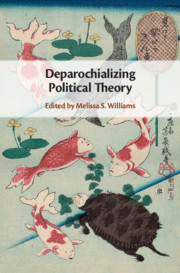Book contents
- Deparochializing Political Theory
- Deparochializing Political Theory
- Copyright page
- Dedication
- Contents
- Tables
- Contributors
- Preface and Acknowledgments
- Note on the Text
- 1 Introduction
- 2 Deparochializing Political Theory and Beyond
- 3 Recentering Political Theory, Revisited
- 4 A Decentralized Republic of Virtue
- 5 Deparochializing Political Theory from the Far Eastern Province
- 6 Is Popular Sovereignty a Useful Myth?
- 7 Authoritarian and Democratic Pathways to Meritocracy in China
- 8 Deparochializing Democratic Theory
- 9 Teaching Comparative Political Thought
- 10 Teaching Philosophy and Political Thought in Southeast Asia
- 11 Why Globalize the Curriculum?
- Index
8 - Deparochializing Democratic Theory
Published online by Cambridge University Press: 15 March 2020
- Deparochializing Political Theory
- Deparochializing Political Theory
- Copyright page
- Dedication
- Contents
- Tables
- Contributors
- Preface and Acknowledgments
- Note on the Text
- 1 Introduction
- 2 Deparochializing Political Theory and Beyond
- 3 Recentering Political Theory, Revisited
- 4 A Decentralized Republic of Virtue
- 5 Deparochializing Political Theory from the Far Eastern Province
- 6 Is Popular Sovereignty a Useful Myth?
- 7 Authoritarian and Democratic Pathways to Meritocracy in China
- 8 Deparochializing Democratic Theory
- 9 Teaching Comparative Political Thought
- 10 Teaching Philosophy and Political Thought in Southeast Asia
- 11 Why Globalize the Curriculum?
- Index
Summary
In this chapter, Melissa Williams begins from the challenge that most contemporary democratic theory is rooted exclusively in Euro-American thought traditions. This is problematic not only for understanding democracy in non-Western contexts but also for crafting democratic theory that can be responsive to globalization. How can a theory of democracy claim global validity if it draws exclusively on Western political experience? The chapter adopts an experimental and playful approach to mapping a strategy of inquiry for deparochializing democratic theory in a global age. It identifies points of contact between contemporary debates over global democracy and forms of contemporary politics that draw on non-Western understandings of the political, focusing on the scales of politics that are most salient for democratic political action: global, state, transnational, and local. The chapter considers three case studies of non-Western conceptions of democracy at these different scales: contemporary Chinese cosmopolitanism (tianxia theory), state-led local democratization in China, and the transnational peasants’ movement, La Vía Campesina. Drawing connections between these cases and the literature on democracy in the global era, the chapter argues that the cases press us toward a transcultural, trans-scalar, translocal, and systemic understanding of democracy’s global potential.
Keywords
- Type
- Chapter
- Information
- Deparochializing Political Theory , pp. 201 - 229Publisher: Cambridge University PressPrint publication year: 2020
- 5
- Cited by

